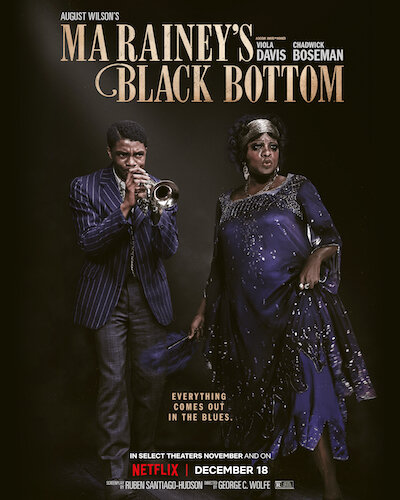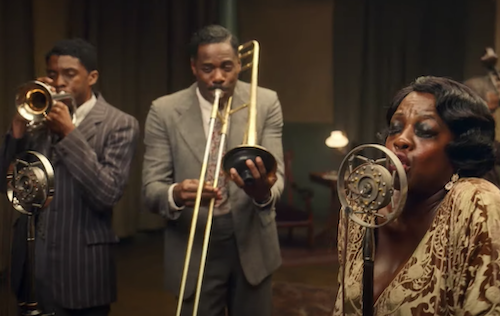Ma Rainey's Black Bottom
Written by Andreas Babiolakis
We are playing catch up by reviewing films that are a part of the current awards season.
Biographical pictures tend to lean heavily towards being acting vehicles, where the performances of famous-people-playing-other-famous-people can outweigh the other cinematic elements. It’s why these films aim for conventional, bite sized narratives and the most obvious choices. Of course, more inventive biographical films are much appreciated, but a motion picture that falls in between inventive and monotonous is also fine. That’s where Ma Rainey’s Black Bottom finds itself, which is a bit interesting, given how a sizeable amount of the film is actually fictional. Based on a real figure (the Mother of the Blues herself Ma Rainey) with some fabricated portions to tell a story about racism in the music industry, George C. Wolfe’s adaptation of August Wilson’s play feels like a conventional biopic with a lot of poignancy on top (again, strange for a film that actually isn’t really a biographical film at all).
The entire film does feel like it came from a play, which isn’t necessarily a bad thing. Most of Ma Rainey’s Black Bottom takes place over the course of a day. A recording session for Rainey’s latest song is full of tension and misfortunes, and they all start with the titular singer arriving to the studio an hour late. Well, technically the anxiety begins beforehand, with Levee Green (a fictional character, I believe) trying to make it big as a solo musician, and fed up with being told how to perform. The studio is clearly piping hot, with beads of sweat dripping off of the faces of every participant. Even when pleasantries are being passed around, everyone looks rather uncomfortable. This is clearly a recording session that’s meant to be recorded and gotten over with, but it keeps getting prolonged.
The performances in Ma Rainey’s Black Bottom elevate the picture to new heights.
I labeled this film an acting vehicle, not because the performances are the only parts that matter. The editing is so crisp and fluid; it makes the whole “the entire story happens mostly in one day” element not feel exhausting, but exciting instead. The dialogue is incredibly sharp and provocative, and it gets the themes of privilege and prejudice in both society and the arts out crystal clear. Still, Ma Rainey’s Black Bottom is still as great as it is mainly because of the performances, and there’s nothing wrong with that. Viola Davis is always consistent, and her work as Ma Rainey herself is no different. Even though she’s not quite in the film as much as you might think going into this picture, she still dominates as many moments as she can. You can’t really expect much more or less from her at this point. The supporting cast is also super strong, with great turns by Colman Domingo and Glynn Turman, amongst others.
Then, there’s Chadwick Boseman. I’m going on record to state that he steals the entire picture. As Green, Boseman is already so magnetic to watch; he uses little quirks to make his character so humanistic (especially convincing when it comes to a film inspired by real people and events; you second guess whether he actually is real or not). Then, drama ensues, and Boseman takes the film with one hand and carries it so effortlessly. This truly is Boseman’s finest performance, and I’m so sad that he isn’t around to see the much deserved accolades heading his way. It’s the turning point his career was always building up towards. His character is especially important, as if he is a representation of the frustration of black marginalization in entertainment; this is especially true when the film concludes.
An entire feature film is devoted to the heart and soul that these African American musicians put into this one song, and Ma Rainey’s Black Bottom wraps up with an effortless, easy performance of Green’s music by an all-white band. Just like that, history gets rewritten, and legacies are forgotten. Case in point: Ma Rainey’s contributions to the blues genre aren’t discussed nearly as often as they should be. George C. Wolfe isn’t prepared to let her legacy be neglected. Even in this part-fiction retelling of her impact on music (one that doesn’t lie about her influence, mind you), you get the sense of an entire world that meant something to one community, and was deemed worthy of profit alone by another. It’s a nice touch on a genre that relies too heavily on being toothless; Ma Rainey’s Black Bottom is as risky, raw, and commanding as Ma Rainey herself was.
Andreas Babiolakis has a Masters degree in Film and Photography Preservation and Collections Management from Ryerson University, as well as a Bachelors degree in Cinema Studies from York University. His favourite times of year are the Criterion Collection flash sales and the annual Toronto International Film Festival.






